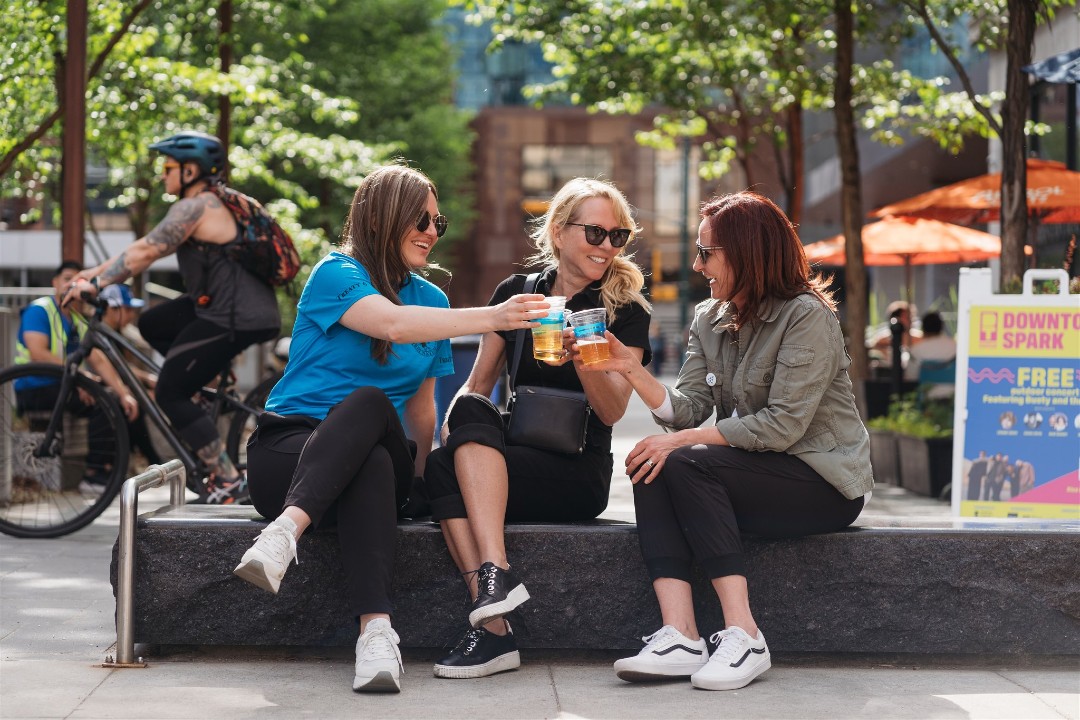The City of Edmonton requires patrons in its entertainment districts downtown to use single-use plastic cups despite the concerns of its operating partner and its own efforts to reduce single-use plastics through a dedicated bylaw, Taproot has learned.
The Edmonton Downtown Business Association expressed its concerns about plastic cups being required and used at the districts before the 2024 pilot on Rice Howard Way, executive director Puneeta McBryan said via email.
The city did not heed those concerns.
Daniel Kielback, the senior waste policy planner for waste services at the City of Edmonton, said in an emailed response to Taproot's questions that entertainment districts are exempt from the single-use item reduction bylaw that went into force in July 2023.
Most Edmontonians probably know the bylaw, which 45% of respondents to a city survey described as unreasonable, because it stipulates that retailers and hospitality operators must charge customers at least $0.25 for disposable bags and $2 for reusable bags, rather than hand out free plastic ones.
For beverages, Edmonton's bylaw stipulates that most restaurants must use reusable cups for dine-in service and have a written policy to accept reusable cups brought in by customers, Kielback said.
The downtown business association oversees the entertainment districts on Rice Howard Way and 104 Street on behalf of the city. McBryan said via email that the association "discussed our concerns about the creation of plastic waste through these cups with City staff in 2024, but ultimately we have and will continue to follow their direction."
McBryan added that it was the city that picked plastic cups, as opposed to a compostable alternative, to meet the budget for the pilot run of an entertainment district on Rice Howard Way in 2024.
The City of Edmonton did not mention the budget in its statement despite Taproot asking about it.
The single-use plastic cups are used for alcoholic beverages that visitors purchase at bars and restaurants within entertainment districts, which they can then consume in the street — a change from standard rules meant to encourage vibrancy.

The City of Edmonton said it requires clearly identifiable cups for alcoholic beverages in entertainment districts because they may not leave district boundaries. The cups are made from plastic. (Understudy Studio)
Both McBryan and Kielback said the cups used in the districts must be recognizable because they contain alcohol, which is illegal to consume outdoors outside the districts. For the same reason, customers cannot cut down on plastic use by bringing their own reusable cups for alcoholic drinks at the districts.
Kielback said the city works with businesses to reduce waste in other ways, such as reusable cup programs for beverages other than alcohol served during district hours. One project he works on, which is not limited to entertainment districts, is a new thing he called "mug libraries," where customers can borrow and return reusable mugs in lieu of a disposable vessel. Kielback said 14 businesses ordered city-made posters to promote mug libraries since April, and 30 businesses requested similar posters that encourage customers to bring their own cups.
He also said the city will further encourage reusable cups as an alternative as it moves forward on waste-reduction initiatives. Kielback said business owners who want to cut down on single-use products can find tools at a city resource page.
As for the role the entertainment district cups play in Edmonton's overall waste production, Kielback said it is "relatively minor," because entertainment districts operate only on weekends and seasonally. That footprint may grow, however, because the city is considering a section of Happy Beer Street on 78 Avenue as its first entertainment district beyond downtown.
Oceana Canada, a charity with a mandate for ocean conservation, wrote in June 2021 that 86% of Canada's plastic finds its way to landfills, just 8% is recycled, and the rest is incinerated. Made in CA, an organization that compiles products and services made in Canada, reported recently that Canadians produce 694 kilograms of plastic waste per person yearly, the highest global average, and that the country recycled only 16% of plastic waste in 2022.
In May 2024, Calgary rescinded its equivalent single-use policy. Premier Danielle Smith said at the time that she hoped other cities would do the same.
